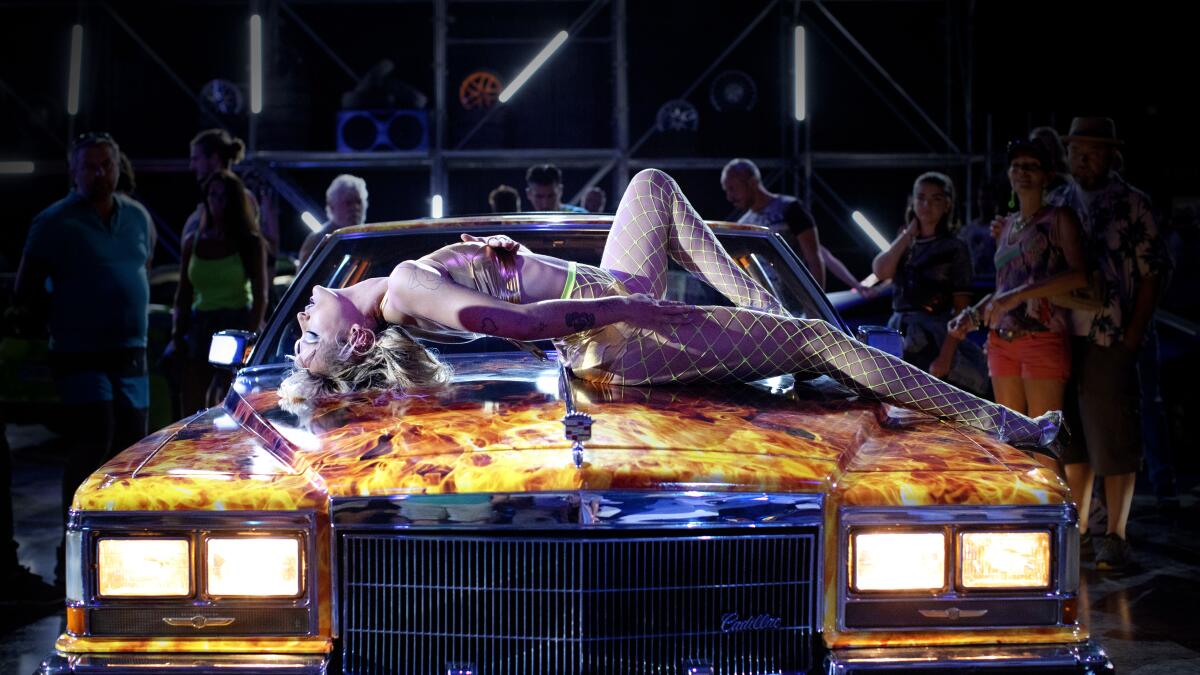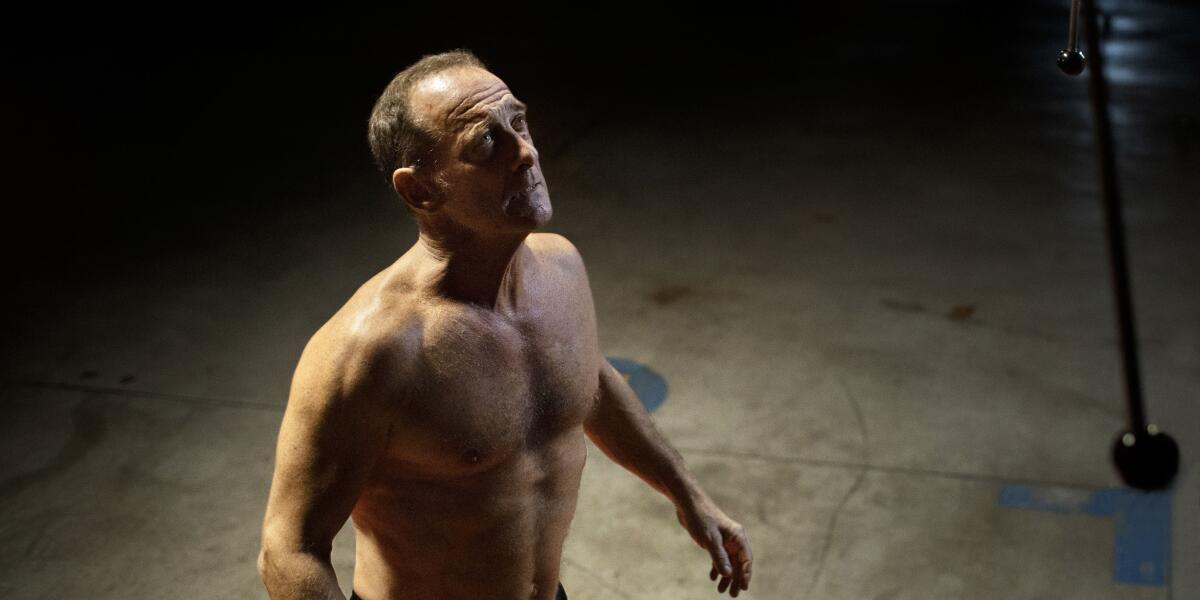Review: Outré sex and violence aside, Cannes-winning ‘Titane’ is a surprisingly sweet love story

- Share via
The Times is committed to reviewing theatrical film releases during the COVID-19 pandemic. Because moviegoing carries risks during this time, we remind readers to follow health and safety guidelines as outlined by the Centers for Disease Control and Prevention and local health officials.
Not long into the French shocker “Titane,” 7-year-old Alexia (Adèle Guigue) is involved in a car accident that cracks her head open like a cantaloupe. She emerges from this trauma with a permanent grudge against her father (Bertrand Bonello) — bad dad, worse driver — and a large titanium plate surgically embedded in her skull. That plate is temporarily held in place by a metal brace that frames Alexia’s noggin like a halo, or perhaps a crown of thorns; either way, the religious imagery is surely no accident. In the hands of writer-director Julia Ducournau, this knowingly transgressive horror odyssey is both nativity story and passion play — a tale of the old flesh being bent and broken as it gives birth to the Cronenbergian new.
The biblical allusions don’t end there. An oil-slicked, neon-drenched, gender-and-fender-bending vroom-gasm of a movie, “Titane” also sometimes suggests a cheerfully deranged riff on the parable of the prodigal son. It follows the adult Alexia (a mesmerizing Agathe Rousselle) as she goes on a wild rampage, ditching one father only to be pulled into another’s embrace. If that sounds sentimental, fear not: The gospel according to Ducournau doesn’t let anyone off the hook so easily, the audience included. The movie’s first half-hour is a chain-reaction pileup of sadistic violence, nearly all of it meted out by Alexia, a prodigious serial killer (and promising arsonist) who likes to stab her victims through the ear with her hair stick.
Alexia’s habit of penetrating human heads with metal — she isn’t picky about the heads, whether they belong to a female lover (Garance Marillier) or a male harasser — suggests a sexually charged need to reenact her own vehicular trauma. It’s not the only such example; Alexia says almost nothing throughout the movie, but her demons are as apparent as the spirally surgical scars above her ear. By night she dons fishnet tights and dances as a car model, twerking atop a handsome vintage Cadillac for the drooling delectation of men. That public come-on is a mere warm-up for what happens in private: Cue “Titane’s” most attention-grabbing scene, in which Alexia proceeds to have sex with — not in, but with — the aforementioned Cadillac.

Here I’ll offer a clarifying word or two on the mechanics of the act, even if the movie leaves them either mercifully or disappointingly vague. The Caddy, it should be noted, does not honk if it’s horny. It simply turns on the headlights, emits a few come-hither rumbles and waits as Alexia straps herself into the backseat and initiates her own frenzied joyride, sans lubricant, muffler or shock absorber. Soon it becomes clear that Alexia is pregnant from this mechaphile fling, a development that calls forth some of Ducournau’s most memorably appalling images, from the rapid prosthetic swell of Alexia’s belly to the steady black drip of motor oil from multiple orifices. It’s not clear whether she’s having a boy or a grille.
Maybe I could’ve led with a spoiler warning (and by spoiler I don’t mean to imply any untoward activities involving the car’s rear wing). Then again, you may have already read a thing or two about “Titane” a few months ago when it premiered at Cannes, where it generated walkouts, hoots of laughter, and waves of social media shock and awe, plus scattered reports of fainting and vomiting — the usual hallmarks, in other words, of a calculated film-festival outrage. But unlike past Cannes scandal seekers like Lars von Trier’s “Antichrist,” Gaspar Noé’s “Irreversible” and, most saliently, David Cronenberg’s masterpiece of automotive anti-erotica, “Crash,” “Titane” conquered more than it divided. Critics were largely seduced; the jury awarded the film the Palme d’Or, making Ducournau only the second woman director (after Jane Campion for 1993’s “The Piano”) to receive the festival’s highest honor.
Love or hate that decision, it was a significant milestone and a fitting one, given how insistently “Titane” devotes itself to dismantling orthodoxies around gender and sexuality (more on that shortly). But its Cannes triumph also sets up the movie for an inevitably cooler reception abroad, forcing it to compete with its own overblown art-house-meets-grindhouse hype. It’s hardly a problem unique to “Titane”: Absent the element of surprise, even the most heroically uncompromising vision often runs the risk of being later dismissed as a showy, self-admiring stunt.
Maybe that’s exactly what Ducournau’s movie is. But to these eyes, ravished by the retina-scorching purples and blues of Ruben Impens’ cinematography — and also to these ears, ringing with the ominous choral chants of Jim Williams’ score — a little self-infatuation is more than warranted. If “Titane” is sometimes a bit too taken with its own daring, it also has a sharp, poker-faced awareness of its own absurdity. As in her splendid cannibal thriller, “Raw,” with its artful commingling of the delicate and the grotesque, Ducournau excels at keeping contradictory themes and tones in productive tension. You will sometimes hear the grind of shifting narrative gears (along with some ingeniously repurposed pop-rock songs), but you are also borne smoothly along as the story glides from body-horror nightmare into a more subtly unnerving dramatic register.

Ducournau is aided by skilled collaborators behind the camera — especially production designers Laurie Colson and Lise Péault, with their flair for cavernous, womb-like spaces — and by actors game enough to follow her to the brink of madness and beyond. The ability to engender sympathy for a cold-blooded killer is but one aspect of Rousselle’s astonishing, virtually wordless performance: With her ferocious physicality and stone-chiseled glare, she certainly makes you fear Alexia in all her murderous sociopathic rage. But she also makes you fear for Alexia, who can outrun the authorities but can’t escape the agonizing contortions and messy alien effluvia of her own body.
Through a chain of events too bizarre to summarize, Alexia takes refuge in the home of a lonely, aging fire chief named Vincent (a magnificent Vincent Lindon). There, she passes herself off as Vincent’s long-lost son, Adrien — a ludicrous yet fully sustained delusion in which they both willingly take part, and which fulfills their very different but equally profound needs. Cutting her hair and binding her breasts, Alexia trades in the over-sexualized femininity she once wielded with abandon. As she joins the studly ranks of Vincent’s junior firefighters, she enters a world where performative masculinity abounds (as does its close cousin, homoerotic desire). In “Titane,” sexuality is as fluid as gasoline and gender is a concept both restrictive and elastic — a prison whose bars can be pried apart, though only at great personal risk.
If Alexia’s plight reveals the toll of trying to escape that prison, Vincent shows us the dangers of succumbing to it. Injecting steroids daily into his ridiculously bulked-up frame, he’s like a hulking parody of hyper-masculinity, even as he subverts that parody by showering Alexia/Adrien with an unfashionable and unconditional tenderness. There’s something strangely moving about the way both Rousselle, a chameleonlike newcomer, and Lindon, one of French cinema’s great stalwarts, submit to such radical physical transformations, emphasizing the wear-and-tear fragility of their own flesh. There’s also deep feeling in their characters’ surrogate parent-child bond; again and again, this movie’s sneaky emotion catches you off guard — and feels no less sincere for having been so meticulously engineered.
And “Titane” is nothing if not a triumph of engineering, to the point where the slickness and sophistication of its technique sometimes threaten to overwhelm the rigor of its ideas. Still, it’s hard not to admire the sheer verve with which Ducournau ultimately welds those ideas together. “Titane” is an essay, etched in rivulets of blood and oil, on the mutability of gender and the pliability of desire. It’s also a profane hymn to the specific alchemies of fire and metal, to the dark allure of forces that can destroy us no matter how hard we try to bend them to our will. And finally, perhaps, it’s Ducournau’s attempt to turn that very destruction into a creative act, to envision the world collapsing in an unholy trinity of flame, chrome and flesh — and to pull an improbable and singularly incandescent love story from the wreckage.
‘Titane’
In French with English subtitles
Rating: R, for strong violence and disturbing material, graphic nudity, sexual content and language
Running time: 1 hour, 44 minutes
Playing: Starts Oct. 1 in general release
More to Read
Only good movies
Get the Indie Focus newsletter, Mark Olsen's weekly guide to the world of cinema.
You may occasionally receive promotional content from the Los Angeles Times.











